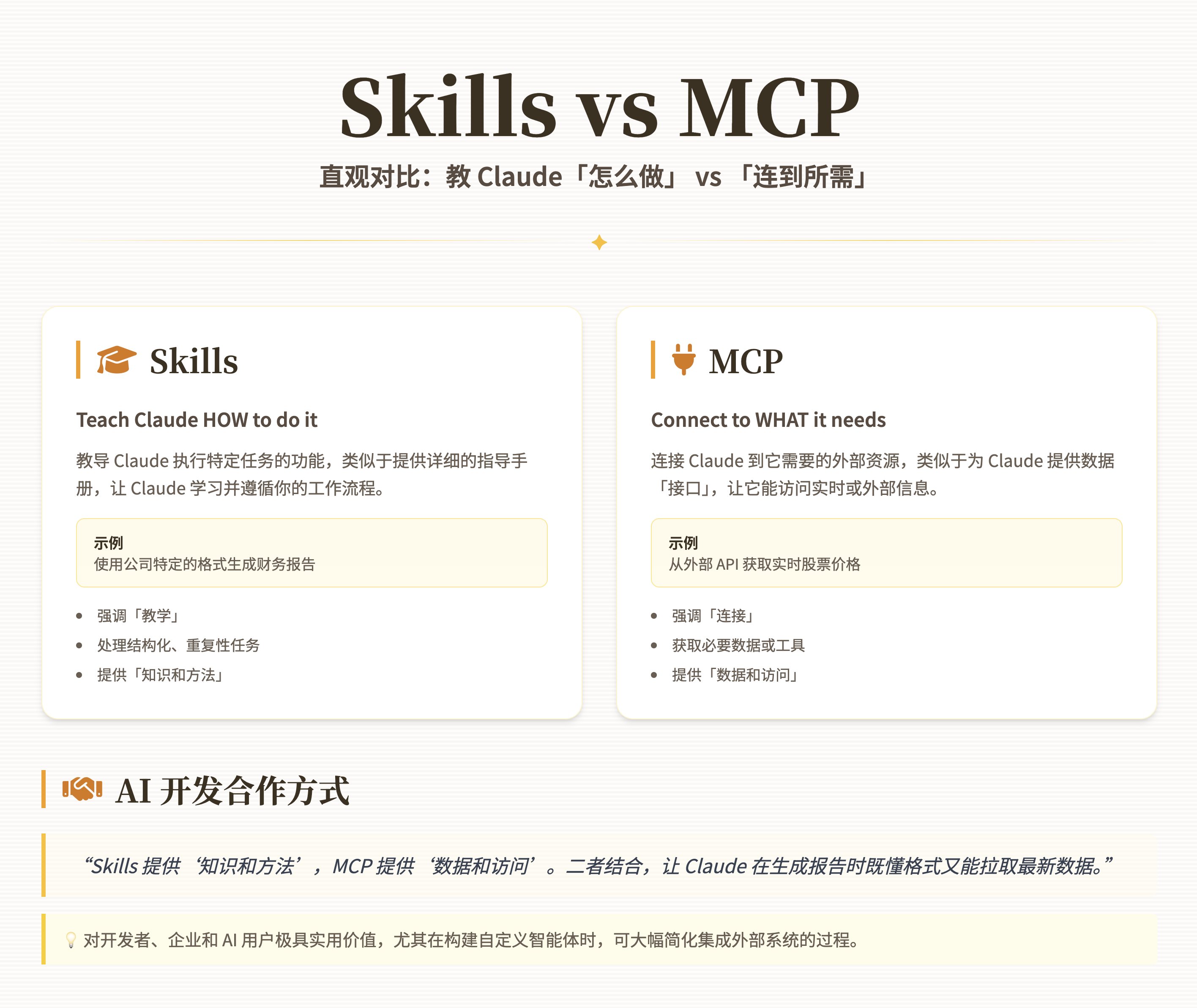Claude Skills vs MCP: A New Paradigm for AI Development Collaboration
Claude Skills vs MCP: A New Paradigm for AI Development Collaboration

I. Background: From "Talking" to "Doing"
Large Language Models (LLMs) are evolving from pure language understanding tools into intelligent agents with execution capabilities.
However, to make AI truly "hands-on", we need to solve two core problems:
- How to teach models "how to do things"
- How to give models "access to needed resources"
Anthropic has introduced two key capabilities in Claude's ecosystem to address these problems respectively:
- Skills: Teaching Claude how to execute tasks
- MCP (Model Context Protocol): Connecting Claude to required external resources
Together, they form the "Brain + Hands + Network" architecture of Claude's agent system.
II. Skills: Teaching Claude "How to Do It"
Definition
Skills are guidance mechanisms that help Claude understand and execute detailed steps for specific tasks, essentially providing "operation manuals" or "Standard Operating Procedures (SOPs)".
Claude is no longer just a "code-writing" model, but a virtual employee capable of "executing tasks according to company processes".
How It Works
When developers define a Skill for Claude, they are essentially:
- Describing task objectives (e.g., "generate daily reports")
- Explaining specific steps, logic, and format requirements
- Teaching Claude how to handle exceptions or recurring tasks
Claude learns these processes and executes them automatically.
Example
Generate financial reports using company-specific formats.
Claude can read company templates → automatically populate data → output standardized reports.
Characteristics
- Emphasizes "teaching" and "execution methods"
- Suitable for structured, repetitive processes
- Essentially the crystallization of knowledge and methodology
In other words:
Skills teach Claude How to do it (how to complete tasks).
III. MCP: Connecting Claude to "What It Needs"
Definition
MCP (Model Context Protocol) is an open communication protocol used to safely connect Claude to external data sources, systems, or tools.
If Skills are "internal brain skills", MCP is the "external senses and arms" that allow Claude to access real-world resources.
Functions
- Connect to APIs, databases, local file systems, etc.
- Enable Claude to obtain real-time information or call external tools
- Unified context communication protocol for cross-system interaction
Example
Retrieve real-time stock prices from external APIs.
Claude can access financial data services through MCP, pulling the latest market data when generating reports for dynamic output.
Characteristics
- Emphasizes "connection and access"
- Provides data and interface layer capabilities
- Acts as a bridge between AI agents and the external world
In other words:
MCP lets Claude Connect to what it needs (connect to required resources).
IV. Skills vs MCP: Core Differences
| Dimension | Skills | MCP |
|---|---|---|
| Goal | Teach Claude "how to do" | Help Claude "connect to what's needed" |
| Focus | Process and task execution | Data and resource access |
| Nature | Methodology (How) | Tools and interfaces (What) |
| Strength | Task automation | Data integration |
| Examples | Generate reports, write documents | Access APIs, read databases |
| Analogy | Teacher | Network and interface layer |
These two systems are not competitive but complementary.
Skills provide "cognitive and execution frameworks",
MCP provides "data and resource pathways".
Combined, Claude can:
- Generate reports according to fixed logic (Skills),
- Automatically obtain real-time data (MCP).
V. AI Development Collaboration Methods
When developers combine both, they can achieve "agent-style development":
Skills provide "knowledge and methods", MCP provides "data and access".
When executing tasks, Claude is no longer limited to prompt-level conversations but can proactively:
- Call external APIs to get the latest data;
- Execute complex tasks according to enterprise-customized Skills;
- Output results through structured processes.
Example Scenarios
| Scenario | Skills Role | MCP Role |
|---|---|---|
| Auto-generate daily reports | Handle format, logic, text generation | Pull real-time metrics from database |
| Automated code fixing | Define repair processes | Access project files and repositories |
| Intelligent customer service | Define response logic | Call backend order systems |
This collaborative model evolves Claude from a "conversational assistant" to a "business agent".
VI. Insights for Developers
Enterprises can define internal knowledge processes through Skills
- Transform organizational experience into reusable AI skill libraries.
- Lower AI usage barriers, achieving "knowledge automation".
Break through enterprise data loops via MCP
- Access real-time business data under security premises.
- Achieve end-to-end loops from generation to decision-making.
Combined usage creates "customized AI employees"
- Claude can execute tasks, generate content, and access systems according to enterprise logic.
- Become truly "delegatable" AI roles.
VII. Summary: New Levels of AI Agent Collaboration
| Role | Description |
|---|---|
| Skills | Claude's "cognitive structure" and "operational methods" |
| MCP | Claude's "external interfaces" and "data pathways" |
| Combined | Claude can "understand tasks + obtain data + execute workflows" |
Anthropic's design philosophy points toward a higher-level agent ecosystem:
LLMs are no longer conversational interfaces, but definable, extensible, networkable intelligent work agents.
In this system:
- Skills are knowledge encapsulation,
- MCP is the pathway to the world,
- Claude becomes the core agent connecting both.
Future development trends will revolve around "AI modular collaboration":
Turn enterprise experience into Skills,
Connect enterprise systems to MCP,
Let AI autonomously understand, execute, and provide feedback.
VIII. Conclusion
The combination of Claude Skills and MCP represents a crucial leap from "passive answering" to "proactive collaboration" for LLMs.
It's not just about technical interface competition, but a fundamental transformation in AI development paradigms:
From Prompt Engineering → to AI Collaboration Protocols.
The next phase of competition won't be about whose model is stronger, but whose "AI collaboration ecosystem" is more complete.